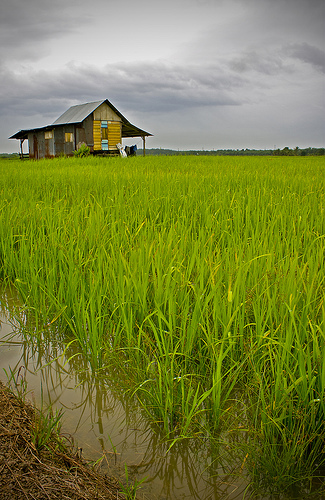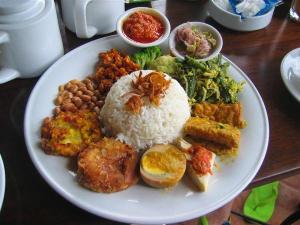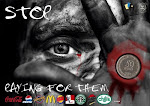
Nasi makanan asasi orang Asia. Sepinggan nasi yang kita telan 3 kali sehari tu bukan calang-calang nasi. Macam-macam onak dan liku telah ditempuh oleh butir-butir nasi itu sehingga mereka berjaya menempatkan diri dalam pinggan kita. Jom kita tengok sikit cerita nasi, beras atau padi ni.
Untuk dapatkan nasi yang TERBAIK, si penanam padi perlu cari benih-benih padi yang terbaik. Benih-benih yang terbaik dikenal pasti, disatukan dalam tapak semaian lalu dibesarkan sampai lah ala-ala sejengkal tingginya. Dalam proses semaian tadi, si penanam padi ni kena jaga serba-serbi benih-benih padi. Air, oksigen, suhu, darjah sinaran matahari, semua di ambil kira. Apa saja keperluan benih-benih ni diberikan dengan sempurna. Segala kasih sayang dicurahkan untuk benih-benih padi tersebut, dengan harapan mereka inilah yang akan membesar menjadi pokok padi yang hebat.
Namun, benih tetap benih. Dalam proses menyemai benih-benih yang terpilih tadi, masih ada juga benih-benih yang tak menjadi. Ada yang diserang spesis kulat Lalai sp., ada yang tak bercambah langsung dan macam-macam masalah. Maka, yang tak menjadi terpaksa dibiarkan. Yang menjadi akan meneruskan proses seterusnya.
Benih-benih padi yang terpilih dan menjadi tadi seterusnya dipindahkan pula ke sawah tarbiyyah nan luas. Di sana, mereka ditanam dan dijaga rapi. Di sana mereka membesar bersama-sama menjadi pokok-pokok padi yang menghijau. Para pesawah menjaga mereka siang dan malam agar tumbesaran mereka terpelihara, dengan harapan, mereka akan menjadi beras-beras yang hebat. Baja cap Ilmu ditabur secara berkala. Air Fikrah dibekalkan dengan mencukupi. Pokok-pokok padi yang hampir tumbang dikukuhkan kembali ke dalam tanah. Begitulah terjaganya mereka tatkala membesar.
Di sawah tarbiyyah yang luas terbentang ini, manfaat pembesaran mereka turut dirasai oleh makhluk-makhluk lain. Si ikan puyu yang tiada kena-mengena dengan pokok padi merasai manfaat berada di celah-celah. Sang belut tak ketinggalan mendiami lubang-lubang sawah. Si siput gondang berasa aman bertenggek di batang-batang padi. Si kodok pula tenteram menetaskan telur-telurnya menjadi berudu bagi meneruskan kemandirian spesisnya. Alam juga tidak ketinggalan merasai oksigen yang dihembuskan oleh liang-liang stoma daun padi. Begitulah banyaknya manfaat pokok-pokok padi terhadap ekosistem sejagat.

Namun, pokok padi tetap pokok padi. Setelah pokok padi menguning lantas menumbuhkan butir-butir buah padi, datang pula cabaran-cabaran menggugat tumbesaran. Dari bawah, tikus-tikus spesis Jahiliyah sp. mencari-cari peluang memakan buah-buah padi yang sudah berhasil. Dari atas, hambatan-hambatan dari burung spesis Harta sp. dan Pangkat sp. sentiasa meletakkan padi dalam bahaya. Banjir futur yang kadang-kadang melanda melemahkan kekuatan pokok padi. Tak kurang juga serangan serangga perosak spesis Syaitan sp. dan virus ukhuwah sp. yang perlahan-lahan merosakkan pokok padi. Rerumput dan lalang yang sentiasa nak bersaing, memburukkan lagi keadaan. Banyak pokok padi yang rosak, mati, dimakan burung, tikus dan dihanyutkan banjir. Yang tinggal hanyalah pokok-pokok padi yang kuat dan terbaik antara yang terbaik. Merekalah yang meneruskan legasi sawah padi ini.
Setelah padi-padi ini matang dan bersedia, tibalah masa mereka dituai. Rijal-rijal padi yang dituai ini digredkan pula mengikut kualiti mereka. Sebahagian mereka ada yang dihantar ke kedai-kedai, pasar-pasar dan kompleks membeli-belah untuk dijual. Segahagian yang lebih tinggi mutunya diimport ke tempat-tempat lain. Lebih tinggi gred mereka, lebih mahal harganya. Begitulah kesudahan mereka, yang terbaik antara yang terbaik. Memberikan manfaat dan kebaikan kepada seluruh alam.
Jom jadi nasi basmathi!
Banyak input-input menarik boleh kita perolehi dengan mengikuti perbincangan panel-panel tersebut.
Panel-panel membedah hakikat berkenaan ibadah puasa yang berdasarkan dalil-dalil yang autentik dari al-Qur'an dan Sunnah berbanding dengan kefahaman masyarakat.
Ikuti perbincangan mereka.. Semoga bermanfaat..
This is the Khutbah for Friday Prayers presented in Medium, Hradec Kralove on the 28th August 2009.
Points to Ponder:
1. The main obstacle of a Muslim - al-Ghaflah
2. The scare that Allah give us to make us awake and the prescription to stay awake.
3. The covenants between us and Allah and no excuses will be accepted if this covenant is broken
4. The parable of those who were give the Signs of Allah, yet he chose to deviate - the parable of a dog.
..............................................................................................................................................................................
Ghaflah – Heedlessness ( Tafsir of Surah al-A’araf, verse 171-179)
Part 1
1. All of us have been reminded multiple times about the importance of Ramadan, the special blessings of Ramadan. And I say we can’t take enough precaution to take the most advantage of this month. And it is indeed a tragedy that year after year, we reach the end of Ramadan, yet, we say that we could have done more. Or we pass by Ramadan, yet we can’t say that we have done our best in this Ramadan. So it is only appropriate to you and me that we take this opportunity, to talk about one of the greatest obstacles facing a Muslim that prevents him from taking full advantage of this month of mercy, forgiveness, this month blessings, this month of starting your life fresh. And that obstacle is what the Quran says as “Ghaflah“ – commonly translated as heedlessness. In fact it is more- it is an attitude of doing something without realizing what we are doing, not thinking of it’s consequences, not caring how our time is spend, what comes out of our mouth, or how our action would impact ourselves and impact the others.
2. If we reflect upon ourselves, for eg. when we are making solah, we are not really doing solah, we are standing and reciting the ayahs but our minds are somewhere else. We are physically in prayer but in our heart we are in state of ghaflah. And so it happens that, we are in the month of Ramadan, we fast, but we are not conscious of the fact that we are fasting. We are hungry and thirsty but in our heart we are again ghafil - in state of ghaflah. Our heart is not fasting like our body does. Allah says in Surah al-Kahf, v. 18:
“Don’t follow the one whose heart We have made heedless of Our remembrance, and who follows his own lusts, and whose affair has been lost”
In this ayah, although Allah is referring to the non-believers, but see, Allah didn’t use the word non believers or something like that. In fact he uses a very specific description – those “whose heart We have made heedless.“ So, this tragedy can also affect a Muslim. And its not permanent. We go in and out of Ghaflah. We are in Jum’ah and we are engaged in the Khutbah, we snap out of Ghaflah. Sometimes, somebody give you a remembrance from an ayah, or and advice and that touches you heart, again you snap out of Ghaflah. And minutes after our Jum’ah prayer, when we step out of the place, when we talk to our friends, when we are inside the cars, again we are into Ghaflah. So how then we prevent this state from overpowering us because it is inevitable that once in a while it will come upon us once a while, but how do we defend against it? How do we become opposite to it – instead of being people of Ghaflah, we become people of Zikr?
3. In order to wake those who are heedless, who are asleep, who have their hearts hardened by states of Ghaflah, Allah says in surah al-A’raf a complete passage about Ghaflah. Allah says:
“And (remember) when We raise the mountain over them as if it had been a canopy, and they thought that it was going to fall on them. (We said): "Hold firmly to what We have given you [the Tawrah], and remember that which is therein (act on its commandments), so that you may fear Allah and obey Him.'')”
4. Allah begins the passage by saying, when he take the mountain above the Bani Israel, and make it like a canopy above them. Now remember if you are not concern about Halal and haram, you are not concern with remembrance of Allah, and you live your life as if you don’t care, then Allah decides to raise the mountain above your head, and shake it above your head, would this be a good reminder for you to wake up? Absolutely. Allah did this to Bani Israel, in such a profound way, but he is also doing it to us in a more subtle way. For eg, when you are in a plane and you are in a turbulence, you would stop listening to any MP3s that you have and say the shahadah, the ayatul Kursi or any ayah that you may remember. Because, in state of emergency, the first one we turn into is Allah. And even the atheist does this. When he see the flood or a volcano eruption, he say, “oh my God!“ without even realizing he do not believe in god, it comes out of his mouth naturally. This state where Allah scares us, these are the opportunities that Allah gives us to make us remember him again.
5. Then Allah say to them, “Hold firmly to what We have given you [the Tawrah] with strength, and remember that which is therein (act on its commandments), so that you may fear Allah and obey Him.” So, similarly, Allah is telling us, that we are to hold on to his Book, the al-Qur’an. And it is appropriate for us to remind ourselves of this fact more so since this is the month of Qur’an. So the Bani Israel has the mountain hovering above them, and are told to hold to their Taurah. You see, in a way, Allah is giving an opportunity to them there. You would think that having a mountain hovering above you as a punishment from Allah. But if this was a means by which they snap out of al-Ghaflah, and they became those who remember Allah again, then this is a gift from Allah. So, look around us. We see the Ummah in tragedy. The Muslims are in such a sorry situation. But if we start looking at it as a tragedy, then that itself is a bigger tragedy. Those events that shocked us, that saddened us, is a mean by which Allah is telling us to wake up. Then, when we wake up, what should we do? While having the mountain hovering above them, making them wake up, Allah tells them the prescription on how to make them stay awake. Hold on to the Book with strength! And keep remembering what is in it. So that you would attain Taqwa – fear, awareness, to be cautious. This is the prescription for us.
6. Allah carry on in the next ayah:
“ And (remember) when your Lord brought forth from the Children of Adam, from their loins, their seed and made them testify to themselves (saying): "Am I not your Lord'' They said: "Yes! We testify,'' so that you wouldn’t say on the Day of Resurrection: "Verily, we were unaware of this.''
To explain this ayah briefly, when all of us were made, in the form of Ruh, he made us all witness of one thing, He made us aware of one thing, “ Am I not your Lord” . Allah says, that all of us - “they” in the ayah is referring to us – we testify by saying “ bala shahidna. ” We bear witness.
And then Allah gave us another profound statement which goes - so that on the Day of Resurrection, we would not say : ”Inna Kunna an haza ghafilin” - "Verily, we were unaware of this.''. We would have no room to say all of these, because Allah has already made us aware of it.
7. In the next ayah, Allah goes on to say:
“ Or so that you wouldn’t say: "It was only our fathers before who took others as partners in worship along with Allah, and we were (merely their) descendants after them; will You then destroy us because of the deeds of men who practiced falsehood''. This is how We explain the Ayat in detail, so that they may turn (unto the truth).”
Allah is warning us so that we would not make other excuse on the Day of Judgement, so that we wouldn’t blame our forefathers, it is their fault, it is not our fault. They made shirk. They raise us as Mushrikun. It was because of their upbringing. Are you going to punish us because of their mistakes? People would make excuses, and Allah is telling us, those excuses would be useless. Then Allah conclude, “This is how We explain the Ayat in detail, so that they may turn (unto the truth).”
Part 2
8. Now, in the next ayah, Allah is speaking towards the Muslim. Allah was telling the stories in the previous ayah with all its lessons, why? Because, so that the Muslim would take remembrance from it. Because, this book is for us, it is for us to take guidance. Yes it is for all mankind, but only the Muslim look into it and take lessons from it. Allah say:
“And recite to them the story of him to whom We gave Our Ayat, but he threw them away; so Shaytan followed him up, and he became of those who went astray”
‘Them’ in the ayah, are us, Muslims. And not just normal Muslims, indeed they’re Muslims with knowledge, that’s why Allah uses the words “whom We gave Our Ayat”. Allah is speaking about a Muslim who knows. Allah is saying, you may know something is wrong but you still do it. We might know the halal from the haram, we know something is wrong, we know what to do, what we shouldn’t do. But we still do it. The wordings that Allah is using are so profound, “fan salakha minha” – meaning “he slithers himself out of the knowledge, the ayah. Like a snake which slithers itself from it skins. He is covered in the knowledge, he knows it, but despite of it, he makes his life different. Allah is giving us an ugly image of such person. The person has a shell which knows Islam, but in reality, that’s not him, he has already shed himself out of it.
When he leaves the ayah, he leaves Allah, so Allah leaves him to. And what happen to this knowledgeable believer? The Shaytan followed him up, and he became of those who went astray – he becomes those who are confused and lost.
9. So in the next ayah, Allah carries on:
“And had We willed, We would surely have elevated him therewith, but he clung to the earth and followed his own vain desires. So his parable is the parable of a dog: if you drive him away, he pants, or if you leave him alone, he (still) pants. Such is the parable of the people who reject Our Ayat. So relate the stories, perhaps they may reflect.”
Allah said, Allah could have elevated him, because of his knowledge. Allah could have given him a more noble status, could have elevated him. But then, again Allah speaks of the tragedy and say, however, this person is inclined to the earth, he is stuck to this earth, his goals were worldly. Allah is giving an image of something pathetic, something lowly. And he just continues to follow empty desires. And this desire is natural to us. Allah says in surah Ali-Imran, v.14:
"Beautified for men is the love of things they covet; women, children, Qanatir Al-Muqantarah of gold and silver, branded beautiful horses (Musawwamah), cattle and fertile land. This is the pleasure of the present world's life; but Allah has the excellent return with Him."
10. So, Allah has made it natural for us to have such desires. But this person of knowledge, because of those desires, he chose to abandon Allah. And because of that, listen to what allah says, “So his parable is the parable of a dog.” Look at how ugly the example is. Again, this is not the non believer Allah is talking about, it is the Muslim, who knowingly, turns away from Allah. If you beat or drive the dog away, it drools, it panting, sticking its tongue out. If you leave it alone , it stills stick his tongue out. Scientist says that the dog needs to keep his tongue out so that it would be able to cool itself. The person, who is knowledgeable but still follow his desire, are like the dogs, because they couldn’t live without fulfilling their desires. Whether they are rich or not, they want the wealth and only the wealth, whether they have desire or not, they are looking at shameless things. Whether they need to or not, they leave solah. Whether they need to or not they leave fasting. You know sometimes you do wrong because you are overwhelmed by the desires or you lose out against your urge. This person is not like that. In conclusion, whether he needs to or not he is pathetic, useless. He forces himself to fulfill his desire.
11. And Allah finishes the ayah, by saying “Such is the example of the people who reject Our Ayat.” Even though they knew about it they still neglect it. So narrate to them clearly Allah says, make them understand, so that they can think deeply, so that they can reflect about their own state.
To be continued...
This text is my note based on the talk of the same title by Bro. Nouman Ali Khan which can be found in www.halaltube.com
.gif)

















